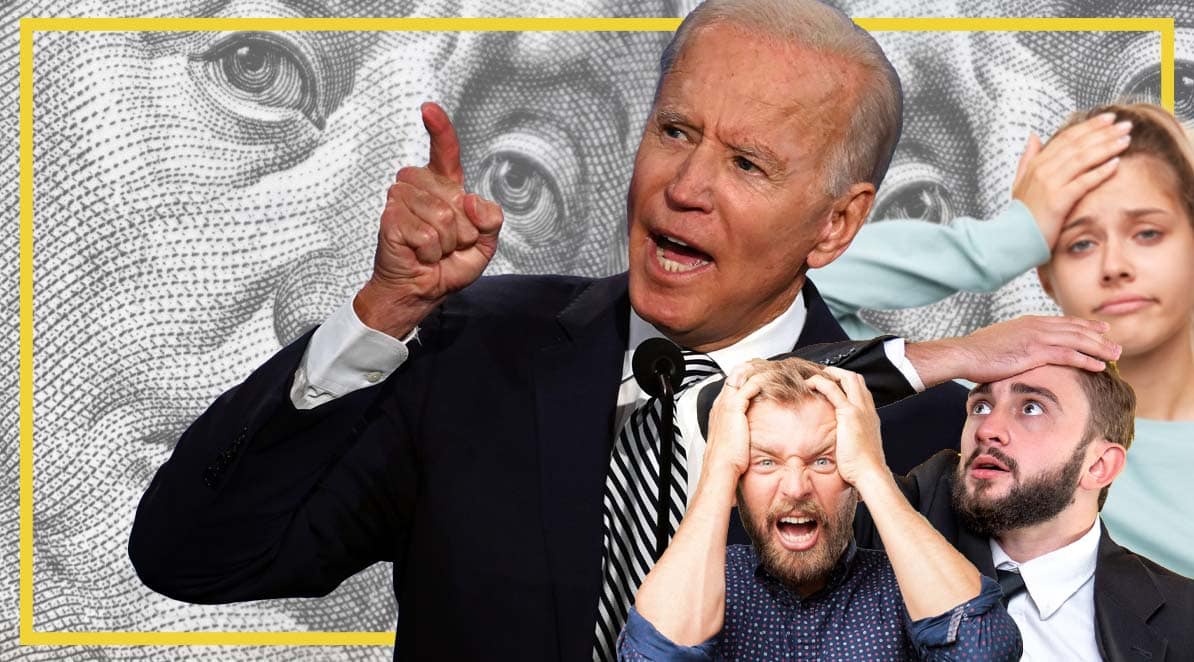It was easy to predict that taxes would be increased in 2021. Biden made no effort to hide his intentions with regards to taxing the wealthy during his election campaign.
Trump had himself campaigned on lower taxes, which he then implemented. How popular were his policies though? Perhaps the Democrats have seen how people have reacted to the widening wealth gap. Most of their policies will only hit those in the top percentile after all.
One of Trump’s reported successes has been that he lowered the corporate tax rate in the US from 35% to 21%. Biden in the meantime is looking to raise this back up to 28%, not something a lot of business owners and shareholders will be keen to see him do. https://t.co/jfLol2kCYo
— #DisruptionBanking (@DisruptionBank) November 4, 2020
In our story from last year we suggested that the relationship between Wall Street and Washington may have deteriorated since 2016. Back then Hilary Clinton had been alleged to have received $600,000 from Goldman Sachs to give a private speech. Donations from Wall Street also dropped in subsequent years, and not just to the Democrats.
Besides, Biden doesn’t hold any shares, why should he care about Wall Street? The U.S. economy is set to have a strong recovery. While markets will surely continue their growth trajectory once the dust settles around Biden’s Tax Plan.
What is Biden’s Tax Plan?
Much of the fuss is centred around the plan to raise Capital Gains Tax from the current base rate of 20% to as high as 43.4%. It will only affect those earning $1 million or more, everybody else can continue trading as before.
Corporate rates would rise from 21% to 28%, exactly what Biden had stated last year. There was also an extra payroll tax suggested for individuals, or perhaps families, earning $400,000 or more per year. Markets mainly reacted to these proposals.
What will Biden spend it on?
There is currently a lot of debate around the American Families Plan which was announced late yesterday:
I sent a letter with 16 of my colleagues today asking President Biden to propose in his American Families Plan the most significant expansion of Medicare since it was signed into law to improve the lives of millions of Americans. pic.twitter.com/SgS5XQOsPi
— Bernie Sanders (@SenSanders) April 25, 2021
First, we saw the $1.9 trillion pandemic relief plan that has already been signed into law. Then we saw the $2.25 trillion infrastructure plan. This will now join the $1.8 trillion plan to expand educational opportunities and child care for families. That’s almost $6 trillion and it’s been barely four months since Biden’s inauguration.
The Democrats are making no secret of the fact that they plan to overhaul the entire tax system. With the spending they have in mind, these initial tax plans will be just that, initial.
President Joe Biden to unveil a sweeping $1.8 trillion plan to expand educational opportunities and child care for families, funded in part by the largest tax increases on wealthy Americans in decades https://t.co/llbPQhjF8u
— Bloomberg (@business) April 28, 2021
How will Wall Street react?
Last year, Fidelity sector strategist Denise Chisholm, prepared a report. In it she discussed how higher rates may not tank the stock market the way investors expect.
Higher tax rates may not tank the stock market the way many investors expect. See these history lessons from past tax hikes: https://t.co/TNbrHeieEP pic.twitter.com/5W8ctkkDFz
— Fidelity Investments (@Fidelity) October 30, 2020
However Wall Street might react, Jim Febeo, senior vice president, head of federal government relations at Fidelity, believes that:
“Anything that passes is likely to be through a budget reconciliation process, requiring a simple majority vote, but also meaning any proposed hikes will require unanimity among Democrats. It will take some time for Congress to negotiate a major package, meaning you probably won’t see new rates take effect until tax year 2022, though capital gains and dividend rate changes could go into effect sooner.”
Chisholm goes on to show in her report how in the 13 previous instances of tax increases, the S&P 500 has shown higher average returns.
Chisholm also suggested that one might expect bonds to benefit, but that they actually tend to struggle. This is confirmed with latest reports on U.S. treasury yields. It shows they have been rising since August, but have dropped off since late March when they almost hit 1.8%.
How much do Biden’s policies really affect Wall Street?
Last year, Goldman Sachs suggested that foreign investors will be the biggest buyers of U.S. equities in 2021. We saw this in the rise of Tesla stock investors amongst challenger bank users all over the world. Revolut, and a horde of other fintechs have been ‘democratising finance’ for years now. This democratisation went into hyper mode during the pandemic. There is no question that foreign investors buying U.S. equities has grown. However, this is not necessarily where Wall Street makes its money, as the GameStop saga proved.
The frenzy over GameStop has inspired amateurs everywhere to shake up stock markets.
— CNN International (@cnni) January 29, 2021
Now China's massive army of retail investors wants to get in on the action. https://t.co/oKICN8zdEO
This year Archegos has probably proved to be the biggest challenge for Wall Street to overcome, so far. It has also shown regulatory blind spots that Washington did not address in the past. Much of the problem surrounds how swaps were used in co-operation with investment banks. Swaps are one of the most profitable areas of investment banking. Back in 2008 this was highlighted as a high risk area when Congress passed the Dodd-Frank Act. Unfortunately, the SEC never actually implemented the changes needed to address these areas. Archegos might have been avoided.
Another big player in U.S. equities are foreign pension funds. Lee G. Zimet, Senior Director at Alvarez & Marsal, wrote about the increase of investments by foreign pension funds, including some of the following points:
“What will come as a bigger surprise to many fund managers, is that the IRS has not developed an income tax return/reporting form for foreign trusts. As such, the federal income tax returns of foreign trusts require an ad hoc combination of forms developed for nonresident individuals and domestic trusts. This creates a “Frankenstein’s monster” of an income tax return (see the below picture of one such US tax return for a foreign pension trust).”
Tax hikes and tax reforms. Lots to consider for Biden. In the meantime, investment banks across the world post record profits for 2020 and the first quarter of 2021.
Once in a Generation investment
To get his plans over the line, Biden has had to make some tough calls and make some tough decisions. But, when it comes to Wall Street, many observers will look at the profits that firms like Citadel are raking in.
Earlier this month, a U.S. congressional committee summoned the CEO of Robinhood and Citadel to discuss the GameStop saga. You can even watch the hearing on YouTube, and not just wait for the transcribed minutes:
Citadel says that it handles 47% of all stock trading by retail investors on a typical day. Many of these will be the same retail investors that Biden is planning to raise taxes for this year. Biden will also be aware of forecasted profits for 2021 at Citadel. They are forecast to supersede by a substantial amount the revenues of $6.6 billion posted for 2020.
And, finally, there are all the Crypto investors. Their fortunes dramatically increased when Bitcoin started its charge from less than $9,000 per coin exactly a year ago, to reach over $60,000 just this month.
The fight for the hearts and minds of the U.S. Electorate continues. Biden’s job approval rating after 100 days is 54 percent. Trump came in at 42 percent on his 100th day as President. The team at FiveThirtyEight point out, though, that even with a 54 percent approval rating, Biden’s approval is still lower than any other newly elected president’s going back to 1953.
The polarized political spectrum in the U.S. coupled with the GameStop and Archegos scandals, makes it a sophisticated battleground between Wall Street and Washington. And, remember, Biden still needs to get his plans through Congress. Most of the House of Representatives fall into the bracket of the top earners that Biden is targeting.
Author: Andy Samu
#AmericanFamiliesPlan #WallStreet #CapitalGainsTax #CorporateRates #TaxPlan #PensionFunds #RiseofTheRetailInvestor #Crypto #Congress
















One Response